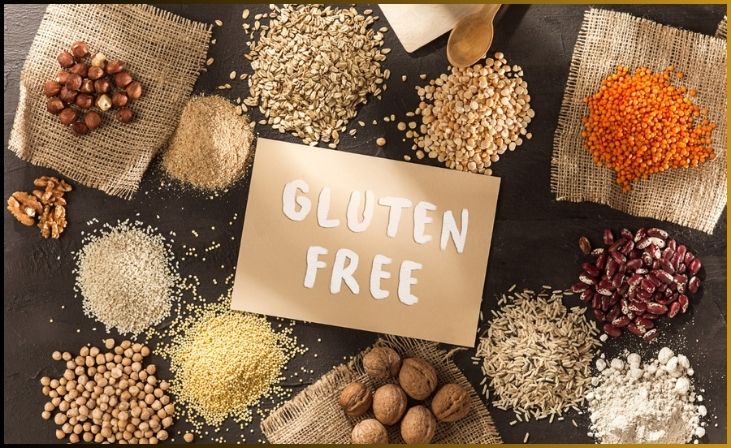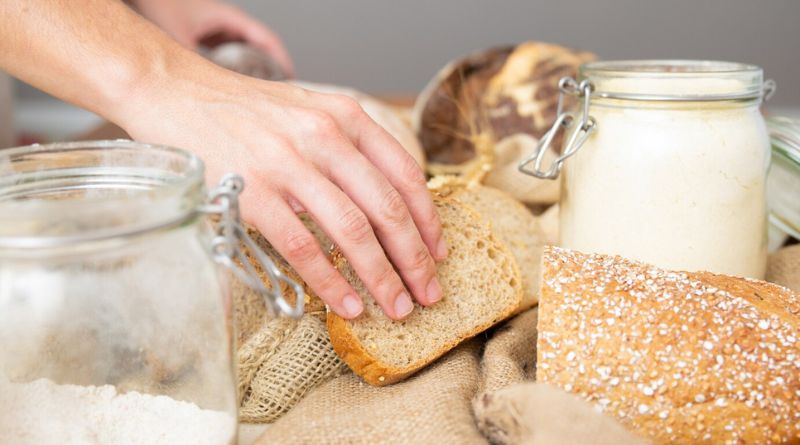At Fermentools, we take our sourdough seriously. That is why we have posted on safe starters, how to make your own starter, and many recipes. This one will cover the benefits of sourdough bread.
Store-bought conventional grains, soaked grains, sprouted grains, soured grains, or no grains–it seems like everyone has their own idea of how best to consume grain. Regardless of where you stand personally on the topic, most experts agree that soured or fermented grains are one of the healthier choices available. Let’s look at a few of the benefits of sourdough.
While nearly any grain can be fermented, one of the most commonly recognized fermented-grain concoctions is sourdough bread. Sourdough is created with just a few simple ingredients: flour, water, salt, and a starter. The starter is where the real magic of sourdough begins.
A sourdough starter is simply flour and water, “fed” on a regular basis, and left to sit at room temperature while it develops. Over time, the starter “captures” wild yeasts, making it a perfect leavening agent for your bread. It also ferments, helping to improve the digestibility of your finished product.
Amazing Health Benefits of Sourdough
Sourdough bread has a rich history and a distinctive flavor profile that sets it apart from conventional bread. What makes sourdough unique is its method of preparation, utilizing naturally occurring yeast and bacteria for fermentation. Beyond its delightful taste and texture, sourdough offers various health benefits. This article explores the advantages of incorporating sourdough into your diet, delving into its potential health perks, and addressing common inquiries regarding this ancient and beloved bread.
Digestibility

How is sourdough more digestible? Grains have naturally occurring phytic acid–an “anti-nutrient” that prevents us from absorbing the nutrients in the grain and inhibits the enzymes that we need to digest our food.1 Our inability to properly digest untouched grains is one reason for the current push to properly prepare grains for consumption.
Good news: sourdough and other fermented grains show “significant potential in improvement and design of the nutritional quality and health effects of foods and ingredients.” How so? The fermenting process creates an acidic environment, which in turn allows enzymes to better digest the food and access available nutrients.
Quick Link: Sourdough English Muffins
Glycemic Index
What’s more, sourdough may be more tolerable for those with blood sugar problems. Foods that raise blood glucose levels after meals are said to have a high glycemic index (GI). Happily, sourdough bread creates a lower glycemic response than other breads. This makes sourdough a better choice for the diabetic than regular white bread.
Let’s not forget that sourdough also benefits your wallet. A basic sourdough loaf has a short ingredient list and can be made with hardly anything in the pantry. What’s more, commercial yeast is not needed to bake sourdough. How freeing to leave those pricey little packets behind!
Sourdough is an age-old traditional food that is a joy to make. Its health benefits are also backed by modern science. Why not try a loaf today?
Provides Healthy Bacteria
Sourdough bread undergoes a fermentation process that not only produces its distinctive flavor but also encourages the growth of beneficial bacteria both within the bread and within your body when consumed. This unique method involves natural wild yeast and lactic acid bacteria, which contribute to the bread’s tangy taste. These microorganisms, during fermentation, break down complex compounds, making the bread more digestible. When you consume sourdough, these beneficial bacteria can potentially promote a healthier gut microbiome, aiding in digestion and nutrient absorption. This symbiotic relationship between your body and the fermented bread highlights the remarkable aspect of sourdough, where taste and health benefits come together in each delicious bite.
Don't just scroll, subscribe!
BuzzTrail's unique web-stories are the cure for boredom you've been waiting for.
Less Preservatives

Sourdough bread is naturally endowed with acetic acid, a component that acts as a natural mold inhibitor. This inherent quality allows sourdough to preserve itself without the need for harmful chemical preservatives. By relying on acetic acid, sourdough resists spoilage, ensuring that it won’t go bad easily. This natural preservation process empowers you to choose a healthier and preservative-free option in your food choices, reducing your exposure to potentially hazardous additives commonly found in the industrial food supply chain. Sourdough bread’s ability to self-preserve not only enhances its shelf life but also promotes a safer and more natural approach to enjoying this delightful and nutritious bread.
Nutritional Benefits
Sourdough bread is a nutritional powerhouse, offering a wide array of vitamins and essential nutrients that contribute to your overall health. Within its wholesome composition, you’ll find valuable elements such as iron, manganese, calcium, B vitamins (including B1-B6 and B12), folate, zinc, potassium, thiamin, niacin, riboflavin, selenium, magnesium, phosphorus, and vitamin E. This rich selection of nutrients sets sourdough apart from many other bread varieties, as it retains these vital components that are often lost during the processing of other bread types.
Incorporating sourdough into your diet not only provides a delightful taste but also ensures that you benefit from this diverse nutritional profile. It’s an excellent choice for those looking to enjoy bread that goes beyond mere carbohydrates, offering a range of essential vitamins and minerals that can support your daily well-being and make your meals even more satisfying.
Read Also: A Tasty Sourdough Bannock Bread Recipe
Better for gluten-sensitivity
The extended preparation process of sourdough bread comes with a unique advantage: it allows for the gradual breakdown of gluten proteins into essential amino acids. This means that by the time you consume sourdough, it contains a higher proportion of amino acids rather than intact gluten, making it easier on the digestive system. This is particularly beneficial for individuals with mild sensitivities to gluten, as the transformation of gluten during fermentation and preparation reduces the likelihood of discomfort or adverse reactions.
The soaking and rinsing steps involved in sourdough preparation play a key role in this gluten modification, ensuring that the bread becomes more digestible. As a result, sourdough can be a suitable choice for those who might typically experience discomfort when consuming gluten-containing products, offering a way to enjoy bread without the digestive challenges that often accompany conventional bread varieties.
Provides Good fuel
Sourdough bread, crafted from wheat, acts as a valuable catalyst for fostering the growth of beneficial bacteria within your gut. Its impact is reminiscent of the effects of inulin and oligosaccharides, which are naturally occurring in foods like onions, leeks, bananas, garlic, and asparagus. In essence, sourdough bread serves as a prebiotic, promoting the flourishing of the gut microbiota.
This prebiotic quality is a result of the unique fermentation process that sourdough undergoes. During fermentation, the breakdown of complex carbohydrates in wheat releases compounds that nourish and stimulate the growth of probiotic microorganisms in the digestive system. The synergy between sourdough and the gut’s microbiome can contribute to improved digestion, enhanced nutrient absorption, and overall gut health. It’s a flavorful and nutritious way to support your body’s inner ecosystem.
More “Good Acid”
Sourdough bread is unique for its abundant presence of Lactobacillus bacteria, a type of beneficial microorganism that surpasses what’s typically found in other bread varieties. This microbial richness contributes to higher levels of lactic acid during the fermentation process. This is particularly significant as it creates an environment in which phytic acid, known for its potential to hinder mineral absorption, is reduced.
With increased lactic acid content, sourdough offers several advantages. It enhances the bread’s digestibility, making it easier on the stomach. Moreover, the presence of lactic acid acts as a mineral booster, promoting greater accessibility to essential minerals within the bread. This synergy between Lactobacillus, lactic acid, and reduced phytic acid content underscores the health benefits of sourdough, making it a flavorful and nutritious choice for those looking to optimize mineral intake and ease digestion.
Bottom Line
Sourdough stands out not only for its exceptional taste and texture but also for the potential health advantages it offers. Its fermentation process contributes to easier digestion and increased nutrient absorption, making it a favorable choice for many. While it may not be a perfect solution for everyone, the unique qualities of sourdough certainly make it a bread worth exploring for those seeking a more health-conscious and flavorful option.
FAQs
Is sourdough bread healthier than regular bread?
Is sourdough bread healthier than regular bread?
Sourdough has several potential health benefits. Its extended fermentation process results in increased nutrient absorption and easier digestion compared to standard bread.
What makes sourdough different from other breads?
What makes sourdough different from other breads?
The key distinction lies in its fermentation process, using wild yeast and bacteria, giving sourdough its unique tangy taste and characteristic texture.
Is sourdough suitable for gluten-sensitive individuals?
Is sourdough suitable for gluten-sensitive individuals?
Although not entirely gluten-free, sourdough can be more tolerable for some gluten-sensitive people due to the fermentation process breaking down gluten proteins.
Can I make sourdough at home?
Can I make sourdough at home?
Yes, you can create sourdough bread at home with basic ingredients like flour, water, and patience. There are numerous resources available online that provide detailed recipes and guidance.

